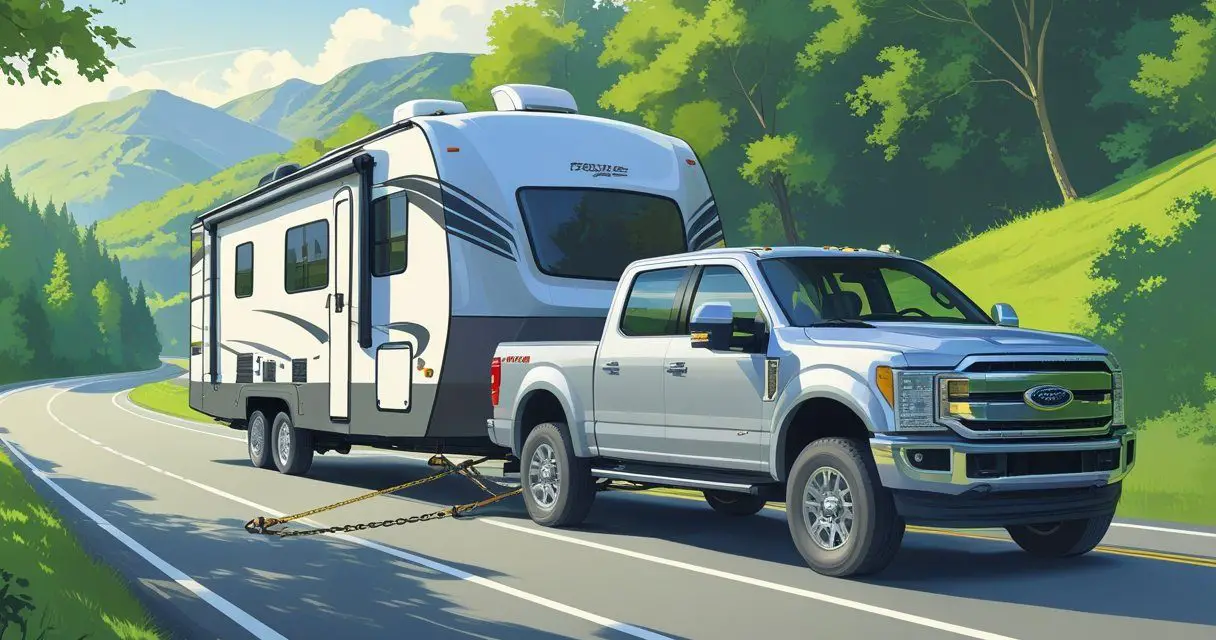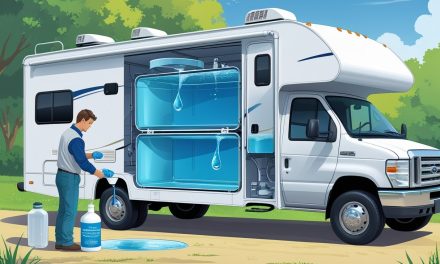If you own an RV or have ever parked one for any length of time, you might wonder what could happen if it’s left somewhere it shouldn’t be. Whether you’re on a road trip, staying at a campsite, or just storing it for a while, the rules about RV parking can sometimes be confusing.
An RV can be towed away just like any other vehicle if it violates local parking rules or ordinances. Knowing this can help you avoid unexpected hassles, fines, or the stress of finding your RV missing after parking in the wrong spot.
1) Parking in a fire lane can get your RV towed immediately.
If you park your RV in a fire lane, it can be towed away without warning. Fire lanes are strictly reserved for emergency vehicles, and blocking them is treated as a serious offense.
Not only can you get hit with a steep fine, but towing and storage fees often add up quickly. The law allows property owners and enforcement to remove vehicles from fire lanes right away in many places.
It doesn’t matter if you were only parked for a short time or just unloading. Being in a fire lane puts you at risk for both a ticket and your RV being towed.
You are responsible for any costs that come with retrieving your RV from the impound lot. Even if you think you have permission from someone on the property, the rules about fire lanes typically override any verbal agreements.
Keep an eye out for signs and painted curbs marking fire lanes. If you’re not sure, it’s best to park elsewhere and avoid taking any chances.
2) Overstaying your welcome in a no-parking zone risks towing.
Would you like to save this article?
When you park your RV in a no-parking zone, you’re taking a clear risk. These areas are set aside for a reason, and local authorities keep a close eye on them.
Even if it seems quiet and no one is around, you might end up with a ticket or worse—your RV could get towed. No-parking zones usually have signs posted, and sometimes those signs include extra warnings like “tow away zone” or “violators will be towed.”
If your RV is spotted parked where it shouldn’t be, it doesn’t matter how briefly you were planning to stay. Sometimes enforcement is strict, and it doesn’t take long for a tow truck to arrive once a violation is noticed.
Towing fees and storage charges add up fast, making the experience both stressful and expensive. If your RV gets towed, you’ll also have to figure out how to retrieve it and get back on the road.
To avoid hassles, always check for posted signs and pay attention to time restrictions. It’s much easier than dealing with a ticket or the headache of getting your RV out of impound.
3) Ignoring local parking ordinances is a common way to lose your RV.
It’s easy to assume you can leave your RV parked wherever you find a spot, but almost every city has specific rules. Local parking ordinances can cover things like when, where, and how long you can park, especially with large vehicles like RVs.
Sometimes, you might not see any posted signs, but that doesn’t mean parking is allowed. Many municipal rules don’t require visible signs for every restriction—so you can still get ticketed or towed if you break them.
Common violations include overstaying time limits, blocking driveways, or parking in areas not zoned for RVs. Homeowners’ associations and business lots may also have stricter rules that they enforce separately.
If you ignore a ticket for your RV, things can escalate quickly. Unresolved fines might double or triple, and your RV can be towed or impounded. Local law enforcement or private lot owners often have the authority to call for towing if you’re in violation.
The safest move is to check local ordinances before parking your RV. This simple habit can help you avoid expensive mistakes and the headache of getting your RV towed.
4) Blocking private property without permission can lead to towing.
If you park your RV in front of someone’s driveway or block access to private property, you could be in trouble. Property owners usually have the right to call a tow company if your RV is parked there without their permission.
Cities and counties often have specific rules about blocking driveways, entrances, or designated parking spots. Even if you think it’s just for a few minutes, owners don’t have to give you notice before arranging for your vehicle to be towed.
In most cases, blocking a driveway is considered a parking violation and sometimes even trespassing. The cost of retrieving your RV after it’s been towed can be significant and will usually be at your expense.
It doesn’t matter if your RV is only slightly over the line—it can still get towed if it’s causing access issues. To avoid headaches and towing fees, always make sure you park in areas where you have permission.
5) Failure to pay parking fines might result in your RV being towed.
If you get a parking ticket while in your RV and decide to ignore it, things can quickly get more serious. Unpaid tickets often lead to extra fines piling up, making the original cost much higher than you expected.
Local authorities may take action if you don’t clear up your tickets. At first, they might send warnings or notices, but continued non-payment can lead to stricter measures. One common step is placing a boot on your RV to prevent you from driving away.
If the fines still go unpaid after your RV is booted, there’s a good chance it could be towed. Cities and towns have different policies, but almost everywhere, refusing to pay your parking tickets puts your RV at risk of being removed from its spot.
When your RV is towed, you’re usually responsible for both the original ticket, added late fees, and the towing costs. Sorting this out can be frustrating and expensive, especially if you rely on your RV for daily living or travel.
It’s much easier to deal with parking tickets right away than to handle the headaches of a surprise tow.
6) Parking where you obstruct access roads invites towing enforcement.
If you park your RV where it blocks access roads, you’re setting yourself up for towing trouble. Access roads are meant to stay clear for obvious reasons—emergency vehicles, other drivers, and even property owners need to get through. Blocking these paths just isn’t allowed in most areas.
Enforcement can be quick. Local authorities or property managers can request a tow if they find your RV causing an obstruction. In places like the UK or the US, blocking a driveway or entrance is a clear violation and is often listed as one of the main reasons to tow vehicles.
You might not get a warning first. Sometimes, towing happens as soon as they spot the problem, especially if it’s affecting safety or emergency access. You could end up paying towing and storage fees, which adds another headache.
Always double-check signs and look at how your RV is parked before leaving it. It’s way easier than dealing with a surprise tow.
7) Squatting on private property without notice can get your RV removed.
If you park your RV on someone else’s property without their permission, it might be considered squatting. Even if you’re not living inside, leaving your RV there uninvited can be a problem.
Property owners usually can’t just have your RV towed right away. They’re often required to give you notice first and follow the legal eviction process. This is especially true if you’re staying in the RV or using it as a living space.
Laws about squatting and abandoned vehicles vary by state and city. Some places might allow immediate towing if the RV is considered abandoned, while others require a specific notice period. If you ignore the notice or refuse to remove your RV, the property owner can contact law enforcement or a towing company.
You might also be responsible for any towing or storage fees. It’s best to avoid parking on private property unless you have clear permission. Taking care to follow the rules helps you avoid having your RV towed away without warning.
8) Leaving your RV parked too long in public spaces can trigger towing.
Parking your RV in a public area for an extended period might seem harmless, but most cities have rules about how long vehicles can stay put. If you leave your RV too long, you could be at risk of getting towed.
Some places have time limits of 24, 48, or 72 hours. After that, authorities may issue a warning, fine, or just tow your RV away. These time limits are meant to keep public spaces open and prevent abandoned vehicles.
You might notice warning signs posted where overnight or long-term parking isn’t allowed. If you ignore them, towing becomes much more likely. Staying aware of local regulations is key, since every city can be a little different.
Private property isn’t any safer if you don’t have explicit permission. Owners can request your RV be removed or towed if it’s been left too long, often with little notice. Always check and respect the posted rules to save yourself a headache.
9) Improperly parked RVs in campsite areas may get towed by management.
If you leave your RV parked in a way that breaks the campsite’s rules, you risk having it towed. Most campgrounds have specific guidelines about where and how to park, often marked by signs or shared during check-in.
Parking outside your assigned spot, blocking roads, or leaving your rig unattended for too long can all be grounds for removal. Some campgrounds also have rules about non-working or inoperable RVs, and these may be towed sooner than you expect.
Campsite staff or management usually make decisions about towing, especially if your RV creates a safety hazard or inconvenience for other campers. Often, you’ll get a warning first, either as a notice on your RV or a knock on your door.
If you ignore warnings or repeatedly break the parking rules, towing can happen without further notice. The cost is usually your responsibility, and it’s rarely a cheap fix. Always read the campground rules and ask questions if you’re unsure about where to park your RV.
10) Violating city-specific RV parking rules can result in fines and towing.
Each city has its own rules for where and how long you can park an RV. If you don’t check these local laws, you could end up breaking them without even knowing.
Some cities have time limits, like only allowing you to park for 72 hours in one spot. Others have size limits or zoning rules that restrict RVs from certain streets or neighborhoods.
If you park in a restricted area or overstay the limit, you might get a warning at first. Often, if the issue isn’t fixed right away, a ticket will follow, and those fines can be pretty steep—sometimes more than $200.
In some places, your RV could be towed, especially if you’re blocking street cleaning or snow removal. If an HOA or municipal authority steps in, towing can happen without much notice.
It’s important to check signs and local ordinances before settling in, even if you’re just stopping overnight. This simple step can help you avoid trouble, fines, and the hassle of retrieving a towed RV.







